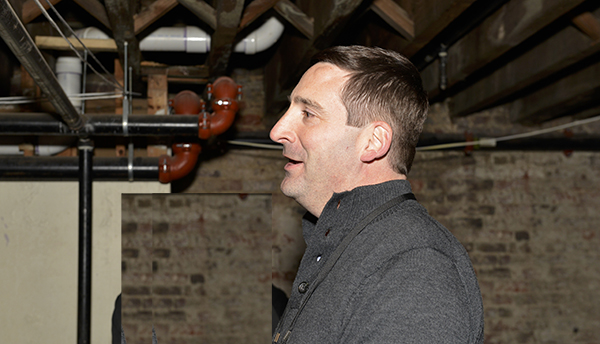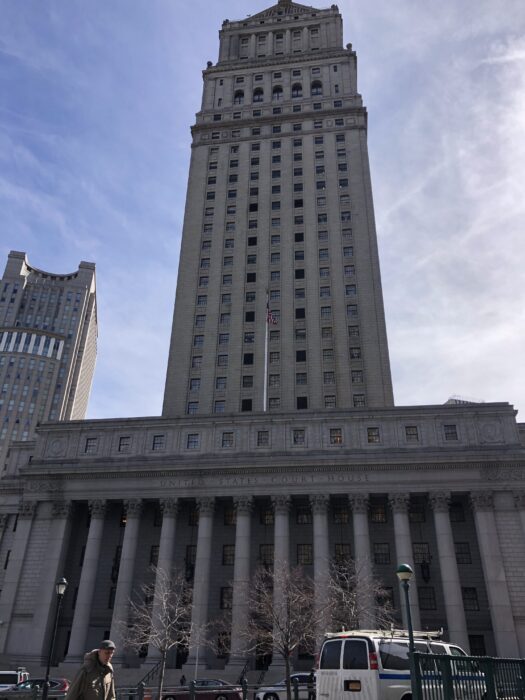By the estimation of federal prosecutors, the reverse mortgage bond scheme perpetrated by Michael Hild and others at Live Well Financial spanned nearly four years, between 2015 and 2019.
And in sentencing Hild on Friday at a hearing in federal court in Manhattan, Judge Ronnie Abrams latched onto that timespan, reasoning that it made sense for the duration of the disgraced CEO’s prison stint to mirror the length of the crime: 44 months.
Hild now awaits the start of that sentence, after he was allowed to remain free on bond while his attorney and federal prosecutors argue whether he should also be on the hook for potentially tens of millions of dollars in restitution to his victims.
His attorney said they also plan to argue for Hild to remain free on bond pending an appeal of the verdict, a filing that must be made within 14 days of Friday’s hearing.
But before the judge handed down the sentence on the 15th floor of the imposing Thurgood Marshall Courthouse about a mile from Wall Street, Hild addressed the court, giving a choked-up apology to all who have been affected by his legal saga.
Dressed in a dark gray suit and wearing glasses, Hild was joined in the courtroom by his wife, Laura, and his brother-in-law.
“I am profoundly sorry for the impact this event has had,” Hild began, as he stood at the podium and faced Abrams.
He apologized to the hundreds of Live Well employees whose jobs were eliminated overnight when he abruptly shuttered the company after the scheme unraveled in 2019. He also apologized to those employees’ families, as well as regulators that oversaw his operations and advocates of the oyster industry, in which he participated through his side company, Anderson’s Neck Oyster Co.
He choked up most noticeably as he began to talk about his investments in Richmond, particularly in Manchester, which the government argues were funded by his fraud.
“To the city of Richmond, which has counted on me to help lift the great community of Manchester out of poverty, I am sorry,” he said.
He also expressed regrets to the employees of the businesses he launched only briefly in Manchester before his legal troubles and the pandemic left them shuttered.
“I simply cannot express how deeply remorseful I am,” adding that he only ever hoped for positive outcomes for all those he was involved with.
While he pleaded not guilty and has continued to blame others for the way the bonds were handled, Hild reflected on the damage the bonds did to his once-promising company.
“Not a day goes by,” he said, that he doesn’t regret getting into the bond business, describing it as a poison that seeped into all aspects of his life.
“If the court would grant me the option of a proverbial ‘do-over,’ I would make different choices,” he said. “Though I don’t know what the future holds, I look forward to trying to continue to serve others in the best way I can.”
Abrams’ ruling for a 44-month sentence was far below the 15 years prosecutors had hoped for. It was drastically lower than the range of 27-33 years suggested by federal sentencing guideline calculations, which in this case Abrams described as “unusually harsh; I’ll add the word draconian.”
The judge said she considered the scheme’s sophisticated means and the fact that Hild perjured himself during his trial testimony. She pegged the loss suffered by Live Well’s four main lenders at around $69 million.
Still in question is how much Hild personally benefitted from the fraud and how much in restitution he must pay to the victim lenders. Abrams said for now she considers that figure to be around $22 million, but is open to further debate with the attorneys from both sides.
She left it open-ended as to when Hild will be called to surrender to U.S. Marshals to begin his sentence.
In addition to working out restitution and a potential appeal, Hild has other legal matters to contend with. He remains party to civil lawsuits filed against him by the trustee of the Live Well bankruptcy estate and the U.S. Securities and Exchange Commission. Laura Hild is also a defendant in the bankruptcy trustee’s lawsuit.
Before adjourning, Abrams imparted some wisdom and advice in Hild’s direction.
“One of things I often reflect at sentencing, is that most people are not all good and not all bad,” she said.
“I don’t think people need to be defined by the worst mistake they ever made. The way you can be defined is how you live your life going forward.”
By the estimation of federal prosecutors, the reverse mortgage bond scheme perpetrated by Michael Hild and others at Live Well Financial spanned nearly four years, between 2015 and 2019.
And in sentencing Hild on Friday at a hearing in federal court in Manhattan, Judge Ronnie Abrams latched onto that timespan, reasoning that it made sense for the duration of the disgraced CEO’s prison stint to mirror the length of the crime: 44 months.
Hild now awaits the start of that sentence, after he was allowed to remain free on bond while his attorney and federal prosecutors argue whether he should also be on the hook for potentially tens of millions of dollars in restitution to his victims.
His attorney said they also plan to argue for Hild to remain free on bond pending an appeal of the verdict, a filing that must be made within 14 days of Friday’s hearing.
But before the judge handed down the sentence on the 15th floor of the imposing Thurgood Marshall Courthouse about a mile from Wall Street, Hild addressed the court, giving a choked-up apology to all who have been affected by his legal saga.
Dressed in a dark gray suit and wearing glasses, Hild was joined in the courtroom by his wife, Laura, and his brother-in-law.
“I am profoundly sorry for the impact this event has had,” Hild began, as he stood at the podium and faced Abrams.
He apologized to the hundreds of Live Well employees whose jobs were eliminated overnight when he abruptly shuttered the company after the scheme unraveled in 2019. He also apologized to those employees’ families, as well as regulators that oversaw his operations and advocates of the oyster industry, in which he participated through his side company, Anderson’s Neck Oyster Co.
He choked up most noticeably as he began to talk about his investments in Richmond, particularly in Manchester, which the government argues were funded by his fraud.
“To the city of Richmond, which has counted on me to help lift the great community of Manchester out of poverty, I am sorry,” he said.
He also expressed regrets to the employees of the businesses he launched only briefly in Manchester before his legal troubles and the pandemic left them shuttered.
“I simply cannot express how deeply remorseful I am,” adding that he only ever hoped for positive outcomes for all those he was involved with.
While he pleaded not guilty and has continued to blame others for the way the bonds were handled, Hild reflected on the damage the bonds did to his once-promising company.
“Not a day goes by,” he said, that he doesn’t regret getting into the bond business, describing it as a poison that seeped into all aspects of his life.
“If the court would grant me the option of a proverbial ‘do-over,’ I would make different choices,” he said. “Though I don’t know what the future holds, I look forward to trying to continue to serve others in the best way I can.”
Abrams’ ruling for a 44-month sentence was far below the 15 years prosecutors had hoped for. It was drastically lower than the range of 27-33 years suggested by federal sentencing guideline calculations, which in this case Abrams described as “unusually harsh; I’ll add the word draconian.”
The judge said she considered the scheme’s sophisticated means and the fact that Hild perjured himself during his trial testimony. She pegged the loss suffered by Live Well’s four main lenders at around $69 million.
Still in question is how much Hild personally benefitted from the fraud and how much in restitution he must pay to the victim lenders. Abrams said for now she considers that figure to be around $22 million, but is open to further debate with the attorneys from both sides.
She left it open-ended as to when Hild will be called to surrender to U.S. Marshals to begin his sentence.
In addition to working out restitution and a potential appeal, Hild has other legal matters to contend with. He remains party to civil lawsuits filed against him by the trustee of the Live Well bankruptcy estate and the U.S. Securities and Exchange Commission. Laura Hild is also a defendant in the bankruptcy trustee’s lawsuit.
Before adjourning, Abrams imparted some wisdom and advice in Hild’s direction.
“One of things I often reflect at sentencing, is that most people are not all good and not all bad,” she said.
“I don’t think people need to be defined by the worst mistake they ever made. The way you can be defined is how you live your life going forward.”



While I don’t necessarily think the judge needed to adhere to the range of 27-33 years suggested by federal sentencing guideline calculations less than 4 years feels very light. Unless Hild truly is bankrupted and his assets confiscated in the coming months I don’t see how such a light sentence serves justice. In my mind he should serve no less than 10 years.
Agreed! A $22 million take might be worth 44 short months. Where’s the justice- this sentence is far too light considering the magnitude of his fraud and all of the lives negatively impacted.
Hild might be “bankrupt” but his wife owns half of Manchester.
Funny how that worked out.
Almost like he took money from one pocket and put it in another.
I had assumed that he would have to turn over all his financial records and that he would have law enforcement digging into his finances.
Can any lawyers explain why that hasn’t happened?
And why he wasn’t put in jail at once?
What didn’t happen in federal court may take place in bankruptcy court as they are notoriously relentless about identifying assets and clawing them back. His wife is also a party to the bankruptcy proceeding. When all is said and done, I don’t believe she will “own half of Manchester”. Actually, she should be criminally charged as well.
The worst part of this is that their Hull Street and Manchester properties continue to be held hostage until they get seized, forfeited to banks, and resold. I think everyone in Richmond is ready to move on!
“To the city of Richmond, which has counted on me to help lift the great community of Manchester out of poverty, I am sorry,” he said.
facepalm
Is the lesson here…..Faster crime = shorter time?
If the $69,000,000 “losses suffered by [HIld’s Lenders]” occurred over one-week’s time, would he be sentenced to 7 days?